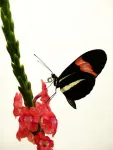(Press-News.org) The full moon has a bad reputation for bringing out the worst in people, from werewolves to lunatics. However, it turns out that the lunar cycle can impact behavior – at least in tropical mammals.
New research appearing in the Proceedings of the Royal Society B reveals that half of the mammal species in tropical forests adjust their behaviors in response to the moon's phases and corresponding variations in light.
By Caleb Hess, Cathrine Glosli
Michigan State University ecologist Lydia Beaudrot, who studies tropical ecology and conservation, was among the international cohort of researchers who contributed to the study.
As human development rapidly and drastically alters some of the darkest places on Earth — including the shaded understories of tropical forests — researchers are racing to understand what happens in these systems under the cover of night.
“This research has implications for how habitat degradation may impact some tropical animals,” Beaudrot said.
No flash photography, please
To understand how tropical mammals reacted to natural fluctuations in light, the researchers examined 2.1 million photographs from automatic wildlife cameras installed across 17 protected forests over three continents.
The image set was sourced from the Tropical Ecology & Assessment and Monitoring Network, or TEAM, which Beaudrot calls an “incredible resource for the scientific community.”
TEAM developed a standardized data-collection system encompassing a global network of parks with game cameras, providing a large-scale dataset by which scientists can examine changes to tropical ecosystems.
By analyzing these images, researchers could derive how nocturnal behaviors changed across 86 mammal species, based on variations of nighttime light levels.
They found that half of the observed species altered their activity levels or timing, or both, in response to changes in light levels.
Beaudrot, an assistant professor in MSU’s department of Integrative Biology, explains that “for tropical forest animals that are awake at night, not all nights are the same. In fact, which species are active depends a lot on the moon.”
What we do in the shadows
Of the 86 total observed species of mammal, 12 species decidedly avoided moonlight, while three species were more likely to emerge under moonlit conditions.
“These were the species with the most pronounced reactions,” said Richard Bischof, professor at the Norwegian University of Life Sciences (NMBU) and a first author on the paper.
While some species exhibited behaviors on the extremes, half of total study species showed some amount of change in behavior corresponding to lunar phases.
Overall, 30% of species avoided the moonlight, compared to 20% that showed some level of attraction to it.
These changes included shifts in when, or even if, species went out at night to travel or seek out food.
Notably, nocturnal species, especially rodents, were over-represented among species that avoided the full moon.
These behaviors may be closely linked with species’ feeding habits – and whether they’re predators or prey. But for either group, going out at night presents a set of strategic tradeoffs.
“Imagine playing hide-and-seek in a dark room, and then somebody lights a candle,” Bischof said. “The light, even if it is weak, may make it easier for you to find your way around the room. But if you are the one hiding, you suddenly become a lot easier to detect.”
Going Out at Night? Not a Very Bright Idea
Increased illumination may make food easier to find and terrain easier to traverse, but it also makes an animal easier to spot – a disadvantage for creatures who rely on the cover of night to move around unseen.
However, the pronounced impact of light — even in the dim forest understory — is spurring concern over how habitat degradation and fragmentation could reshape forest communities.
Human development can reshape or destroy natural habitats. As forests are cleared for land, lumber or other natural resources, pollution can have dire impacts on soil, water and air – and even the light which animals rely on for safety and stealth.
In these transformed environments, thinned forest canopies provide less cover from natural light, and artificial light sources can disrupt natural cycles.
As a result, some animals may miss essential opportunities to secure food or move to new locations. And while some species may better adapt to brighter nights, many species — and even entire ecological communities — could lose.
END
Tropical mammals react to changes in lunar light
2024-10-18
ELSE PRESS RELEASES FROM THIS DATE:
Pennington Biomedical’s EAT2 study to explore unknown effects of weight fluctuations
2024-10-18
Dr. Ursula White, an associate professor of Clinical Science at Pennington Biomedical Research Center, is taking a deep dive into the lasting health effects of short-term weight gain and weight loss. The ability for the fat tissue to expand or contract to accommodate changes in body weight is important for sustained health. Dr. White’s clinical study at Pennington Biomedical, the EAT2 study, will allow her to explore how changes within the adipose tissue are affected by weight gain and weight loss, and what that means for a person’s health.
The EAT2 study is recruiting participants now, and participants will be randomly assigned ...
Butterfly brains reveal the tweaks required for cognitive innovation
2024-10-18
A species of tropical butterfly with unusually expanded brain structures display a fascinating mosaic pattern of neural expansion linked to a cognitive innovation.
The study, published today in Current Biology, investigates the neural foundations of behavioural innovation in Heliconius butterflies, the only genus known to feed on both nectar and pollen. As part of this behaviour, they demonstrate a remarkable ability to learn and remember spatial information about their food sources—skills previously connected to the expansion of a brain structure called the mushroom bodies, responsible for learning and memory.
Lead author Dr Max ...
Time to sustained recovery among outpatients with COVID-19 receiving montelukast vs placebo
2024-10-18
About The Study: In this randomized clinical trial of outpatients with mild to moderate COVID-19, treatment with montelukast did not reduce duration of COVID-19 symptoms. These findings do not support the use of montelukast for the treatment of mild to moderate COVID-19.
Corresponding Author: To contact the corresponding author, Susanna Naggie, MD, MHS, email susanna.naggie@duke.edu.
To access the embargoed study: Visit our For The Media website at this link https://media.jamanetwork.com/
(doi:10.1001/jamanetworkopen.2024.39332)
Editor’s Note: Please see the article for additional information, including other authors, author ...
Drones prove effective way to monitor maize re-growth, researchers report
2024-10-18
Maize, or corn, grows tall, with thin stalks that boast ears of the cereal grain used in food production, trade and security globally. However, due to rain, wind and other increasingly extreme weather events, the maize falls down, risking the entire crop. Called lodging, the physical fall results in shorter plants and overlapping leaves — both of which negatively impact the plant’s ability to grow.
Conventional lodging prevention and mitigation requires many agricultural technicians significant time to investigate the crop fields, according to a team of researchers based in China. They ...
Materials of the future can be extracted from wastewater
2024-10-18
"The perspective is enormous, because you’re taking something that is currently waste and making high-value products from it."
This is what Professor Per Halkjær Nielsen, Department of Chemistry and Bioscience at Aalborg University in Denmark, says about the results of a research project that utilizes surplus biomass in wastewater treatment plants in new ways. The focal point is biopolymers that can be described as long chains of molecules that are bound to each other and that are produced by living organisms, including bacteria. Today, synthetic ...
Long-lasting immunotherapy response in stage IV lung cancer with brain metastasis
2024-10-18
“In the last decade, immunotherapy agents changed the treatment landscape for Non-Small Cell Lung Cancer (NSCLC).”
BUFFALO, NY - October 18, 2024 – A new case report was published in Oncoscience (Volume 11) on October 8, 2024, entitled, “Complete and long-lasting response to immunotherapy in a stage IV non-small cell lung cancer with brain metastasis.”
As highlighted in the abstract of this report, approximately 20% of lung cancer patients have brain metastases at diagnosis, which is associated with a worse prognosis and negatively impacts quality ...
American lobster population, habitat preferences shifting, study finds
2024-10-18
American lobsters along Maine’s coast have relocated to new habitats, while the population simultaneously shrunk in abundance and grew older, according to a new study by University of Maine researchers.
For decades, the vast majority of adult lobsters resided in boulder shelter habitats. This knowledge helped inform longtime conservation efforts and regulations within the more than $740 million fishery.
A team of UMaine scientists, however, found that from 1995-2021, occupancy of boulder habitats dropped 60%. Meanwhile, the number ...
ASA invites media to virtual acoustics meeting Nov. 18-22
2024-10-18
MELVILLE, N.Y., Oct. 17, 2024 – The Acoustical Society of America is hosting a virtual meeting Nov. 18-22. Journalists are invited to virtually attend press conferences on Monday, Nov. 18 and attend technical sessions on Tuesday, Wednesday, and Thursday.
This scientific conference brings together interdisciplinary groups of acoustics professionals, spanning many fields, including physics, medicine, and music, to discuss the latest advancements. From dinosaurs to pipe organs, the virtual conference will cover a wide range of topics. Experts will present ...
Nonnative plants are a major force behind global insect invasions, new study finds
2024-10-18
In an article in the journal BioScience, an international team of researchers led by Dr. Cleo Bertelsmeier from the University of Lausanne, Switzerland, argue that the global spread of nonnative plants is a key factor driving the growing number of insect invasions worldwide. The research challenges traditional assumptions about the principal causes of nonnative insect invasions.
The authors note that when nonnative plants become established in new regions, they create ecological niches that permit the establishment of insect species from the plants' native ranges, which can produce further cascading effects: "Plant invasions ...
Listening to music may speed up recovery from surgery
2024-10-18
Key Takeaways
Music may have a calming effect on patients recovering from surgery– reducing anxiety, perceived pain, and heart rate.
A reduction in cortisol levels when listening to music may play a role in easing patients’ recovery.
Looking for a creative way to quicken your recovery from surgery? The key may be found in listening to music, according to research presented at the American College of Surgeons (ACS) Clinical Congress 2024 in San Fransisco, California.
Researchers at California Northstate ...






